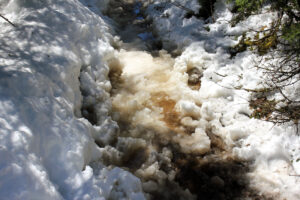
So we all know what a slush pile is, right? It’s the place where unsolicited manuscripts go to die. It’s where editors and agents once in a while find that Holy Grail of a book, the one that wins awards AND makes money. This has been known to happen. Apparently J.K. Rowling, Hilary Mantel and Zadie Smith were all discovered in a slush pile. Not the women themselves, of course. No one mails themselves to a publisher any more. It’s all digital now. Twitter pitches, anyone?
There are some great articles online about slush piles. Masterclass has one. It’s very informative. masterclass.com/articles/slush-pile-explained. Go there if you want to be educated. Stay here if you want to shoot the shit about slush piles.
What I really want to know is why is it called a slush pile, of all things?

Slush is defined as:
- Partially melted snow–dogs pee on it, it ruins your shoes and then it melts away
- A thick drink made from crushed ice–gives you brain freeze and possibly tooth decay
- Waste from the galley of a ship–usually grease and fat from cooking. Gross.
- Trashy, sentimental writing

A slush pile never melts away–ask any editor or agent. It’s an iceberg. You never see the bottom of it. Dogs don’t usually pee on slush piles. Unless of course the editor has brought a pile of manuscripts home to read, flung them to the floor in despair, and the puppy mistakes them for newspaper. It’s much harder to pee on a digital slush pile.

Slush piles may give you a headache but your teeth won’t rot (unless you are drinking a slushie as you read).
Slush piles are not usually greasy, unless an author has decided to enclose a donut or a few fries with their manuscript. This would be preferable to glitter, which never, ever goes away, no matter how much you sweep or vacuum.
Slush piles may include manuscripts that are trashy and sentimental, however. Is this the true source of the term slush pile. No one really knows. Hang on while I ask ChatGPT. Here we go:
The term “slush” originally referred to a mixture of snow and water, often found on the streets after a snowfall. In the publishing context, the “slush pile” metaphorically represents the collection of unsolicited manuscripts that need to be sifted through and evaluated by publishers or their editorial staff.
I appreciate the use of the word “metaphorically” but apart from that, thanks for nothing, Chatbot.
But wait, here’s another explanation. A sum of money held in reserve for vague, often illicit, purposes is called a slush fund. Back in the 18th century, grease and fatty waste from the galleys of sailing ships (see #3 above) were often collected and sold for the production of candles. The money collected was then held in reserve for the ship’s crew so they could buy items their wages did not cover. Hence the term “slush fund.” Charles Boberg, a linguist at McGill University in Montreal, has suggested that slush funds and slush piles may be connected linguistically, since greasy kitchen waste and a pile (or file) of unsolicited manuscripts can both yield something of value. Thank you, Dr. Boberg. Etymology for the win!

If you want some help making sure your manuscript does not end up languishing in a slush pile (digital or otherwise) , click here to set up a FREE 20-minute consultation.
